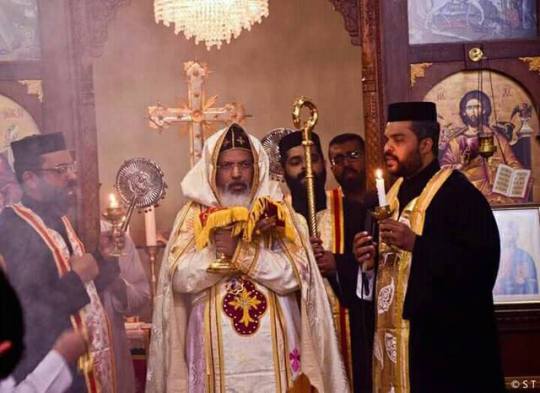Text

16 notes
·
View notes
Text
I wish a blessed Great Fast to all Orthodox brothers and sisters on this day
3 notes
·
View notes
Photo

The Monk Anthony
Commemorated on January 17
The Monk Anthony, a very great ascetic, the founder of wilderness-monastery life and as such the father of monasticism, is entitled “the Great” by Holy Church. He was born in Egypt in the village of Coma, near the Thebaid wilderness, in the year 251. His parents were pious Christians of illustrious lineage. From his youth Anthony was always serious and given over to concentration. He loved to visit church services and he hearkened to the Holy Scripture with such deep attention, that he remembered what he heard all his entire life. The commandments of the Lord guided him from the time of his very youth. When Saint Anthony was about twenty years old, he lost his parents, but in his care remained his sister, a minor in age. Visiting the church services, the youth was pierced through by a reverent feeling towards those Christians who, as it relates in the Acts of the Apostles, sold off their possessions and the proceeds thereof they applied in following after the Apostles. He heard in church the Gospel passage of Christ, spoken to the rich young man: “If thou wouldst be perfect, sell what thou hast and give it to the poor; and thou wilt have treasure in heaven; and come follow after Me” (Mt. 19: 21). Anthony understood this as spoken to him personally. He sold off his property that remained to him after the death of his parents, he distributed the money to the poor, he left his sister in the care of pious virgins in a monastic setting, he left his parental home, and having settled not far from his village in a wretched hut, he began his ascetic life. He earned his livelihood by working with his hands, and alms also for the poor. Sometimes the holy youth also visited other ascetics living in the surrounding areas, and from each he sought to receive direction and benefit. And to a particular one of these ascetics he turned for guidance in the spiritual life.
In this period of his life the Monk Anthony was subjected to terrible temptations by the devil. The enemy of the race of man troubled the young ascetic with thoughts, and with doubts about his chosen path, with anguish over his sister, and he attempted to incline Anthony towards fleshly sin. But the monk preserved his firm faith, he incessantly made prayer and intensified his efforts. Anthony prayed that the Lord would point out to him the path of salvation. And he was granted a vision. The ascetic beheld a man, who by turns alternately finished a prayer, and then began to work – this was an Angel, which the Lord had sent to instruct His chosen one. The monk thereupon set up a strict schedule for his life. He partook of food only once in the entire day, and sometimes only once every second or third day; he spent all night at prayer, giving himself over to a short sleep only on the third or fourth night after unbroken vigil. But the devil would not desist with his tricks, and trying to scare the monk, he appeared under the guise of monstrous phantoms. The saint however with steadfast faith protected himself with the Life-Creating Cross. Finally the enemy appeared to him in the guise of a frightful looking black lad, and hypocritically declaring himself beaten, he reckoned to sway the saint into vanity and pride. But the monk expelled the enemy with prayer.
For yet greater solitude, the saint re-settled farther away from the village, in a graveyard. On designated days his friend brought him a scant bit of food. And here the devils, pouncing upon the saint with the intent to kill him, inflicted upon him terrible beatings. But the Lord would not allow the death of Anthony. The friend of the saint, on schedule taking him his food, saw him as though dead laying upon the ground, and he took him away back to the village. They thought the saint was dead and began to prepare for his burial. But the monk in the deep of night regained consciousness and besought his friend to take him back to the graveyard. The staunchness of Saint Anthony was greater than the wile of the enemy. Taking the form of ferocious beasts, the devils again tried to force the saint to forsake the place chosen by him, but he again expelled them by the power of the Life-Creating Cross. The Lord strengthened the power of His saint: in the heat of the struggle with the dark powers the monk saw coming down to him from the sky a luminous ray of light, and he cried out: “Where hast Thou been, O Merciful Jesus?.. Why hast Thou not healed my wounds at the very start?” The Lord replied: “Anthony! I was here, but did wait, wanting to see thine valour; and now after this, since thou hast firmly withstood the struggle, I shalt always aid thee and glorify thee throughout all the world”. After this vision the Monk Anthony was healed of his wounds and ready for renewed efforts. He was then 35 years of age.
Having gained spiritual experience in the struggle with the devil, the Monk Anthony pondered going into the deeps of the Thebaid wilderness, and in full solitude there to serve the Lord by deed and by prayer. He besought the ascetic elder (to whom he had turned at the beginning of his monastic journey) to go off together with him into the wilderness, but the elder, while blessing him in the then as yet unheard of exploit of being suchlike an hermit, decided against accompanying him because of the infirmity of age. The Monk Anthony went off into the wilderness alone. The devil tried to stop him, throwing in front of the monk precious gems and stones, but the saint paid them no attention and passed them on by. Having reached a certain hilly spot, the monk caught sight of an abandoned enclosed structure and he settled within it, securing the entrance with stones. His faithful friend brought him bread twice a year, and water he had inside the enclosure. In complete silence the monk partook of the food brought him. The Monk Anthony dwelt for 20 years in complete isolation and incessant struggle with the devils, and he finally found tranquillity of spirit and peace in his mind. When it became appropriate, the Lord revealed to people about His great ascetic. The saint had to instruct many layfolk and monastics. The people gathering at the enclosure of the monk removed the stones sealing his entrance way, and they went to Saint Anthony and besought him to take them under his guidance. Soon the heights on which Saint Anthony asceticised was encircled by a whole belt of monastic communities, and the monk fondly directed their inhabitants, teaching about the spiritual life to everyone who came into the wilderness to be saved. He taught first of all the need to take up spiritual efforts, to unremittingly strive to please the Lord, to have a willing and unselfish attitude towards types of work shunned earlier. He urged them not to be afraid of demonic assaults and to repel the enemy by the power of the Life-Creating Cross of the Lord.
In the year 311 the Church was beset by a trial – a fierce persecution against Christians, set in motion by the emperor Maximian. Wanting to suffer together with the holy martyrs, the Monk Anthony left the wilderness and arrived in Alexandria. He openly rendered aid to the imprisoned martyrs, he was present at the trial and interrogations, but the torturers would not even bother with him! It pleased the Lord to preserve him for the benefit of Christians. With the close of the persecution, the monk returned to the wilderness and continued his exploits. The Lord bestowed upon His saint a gift of wonderworking: the monk cast out devils and healed the sick by the power of his prayer. The multitude of people coming to him disrupted his solitude, and the monk went off still farther, into the so-called “interiour of the wilderness”, and he settled atop an high elevation. But the brethren of the wilderness monasteries searched out the monk and besought him at least often to pay visits to their communities.
Another time the Monk Anthony left the wilderness and arrived amidst the Christians in Alexandria, to defend the Orthodox faith against the Manichaean and Arian heresies. Knowing that the name of the Monk Anthony was venerated by all the Church, the Arians circulated a lie about him – that he allegedly adhered to their heretical teaching. But actually being present in Alexandria, the Monk Anthony in front of everyone and in the presence of the bishop openly denounced Arianism. During the time of his brief stay at Alexandria he converted to Christ a great multitude of pagans. Pagan philosophers came to the monk, wanting by their speculations to test his firm faith, but by his simple and convincing words he reduced them to silence. The Equal-to-the-Apostles emperor Constantine the Great (+ 337, Comm. 21 May) and his sons deeply esteemed the Monk Anthony and besought him to visit them at the capital, but the monk did not want to forsake his wilderness brethren. In reply to the letter, he urged the emperor not to be overcome with pride by his lofty position, but rather to remember, that even over him was the Impartial Judge – the Lord God.
The Monk Anthony spent 85 years of his life in the solitary wilderness. Shortly before his death, the monk told the brethren, that soon he would be taken from them. Time and again he instructed them to preserve the Orthodox faith in its purity, to shun any association with heretics, and not to weaken in their monastic efforts. “Strive the yet more to dwell ever in unity amongst ye, and most of all with the Lord, and then with the saints, so that upon death they should bring ye into eternity by their blood, as friends and acquaintances”, – thus were the death-bed words of the monk passed on in his Vita (Life). The monk bid two of his disciples, who had been together with him the final 15 years of his life, to bury him in the wilderness and not arrange any solemn burial of his remains in Alexandria. Of his two monastic mantles, the monk left one to Sainted Athanasias of Alexandria (Comm. 18 January), the other to Sainted Serapion of Tmunta. The Monk Anthony died peacefully in the year 356, at age 105, and he was buried by his disciples at a treasured spot glorified by him in the wilderness.
The Vita (Life) of the famed ascetic the Monk Anthony the Great was written in detail by a father of the Church, Saint Athanasias of Alexandria. This work of Saint Athanasias is the first memorial of Orthodox hagiography, and is considered one of the finest of his writings; Saint John Chrysostom says, that this Vita should be read by every Christian. “These narratives be significantly small in comparison with the virtues of Anthony, – writes Saint Athanasias, – but from them ye can conclude, what the man of God Anthony was like. From his youth into his mature years observing an equal zeal for asceticism, not being seduced by the avenues of filth, and not as regards infirmity of body altering his garb, nor the any worse for it in suffering harm. His eyes were healthy and unfailing and he saw well. Not one tooth fell out for him, and they only weakened at the gums from the advanced years of age. He was healthy of hand and of foot (…). And what they said about him everywhere, all being amazed at him, whereof even those that did not see him loved him – this serves as evidence of his virtue and love for God in soul”.
Of the works of the Monk Anthony himself, there have come down to us: 1) his Discourses, 20 in number, treating of the virtues, primarily monastic, 2) Seven Letters to monasteries – about striving for moral perfection and regarding the spiritual struggle, and 3) a Rule of life and consolation for monastics.
In the year 544 the relics of the Monk Anthony the great were transferred from the wilderness to Alexandria, and later on with the conquest of Egypt by the Saracens in the VII Century, they were transferred to Constantinople. The holy relics were transferred from Constantinople in the X-XI Centuries to a diocese outside Vienna, and in the XV Century – to Arles (in France), into the church of Saint Julian.
© 1996-2001 by translator Fr. S. Janos.
9 notes
·
View notes
Photo

The Syriac Orthodox Church of Our Lady in Diyarbakir (Amed)
This is an Assyrian Orthodox church that had its origin in the 3rd century. It was built on the temple ruins of an ancient sun worshipers. Note their handwritten bible said to date to the Church’s origin. Photography is not allowed within the church, but the Priest did allow an exception to capture the bible image. We were told that some of the block used in the church’s construction were from the original Sun Temple. (x)
121 notes
·
View notes
Quote
Grant me Your grace O Lord Jesus, the Long-suffering, and be with me that I may dwell in You unto the end. Grant me that I may ask and wish always for what is pleasing to You. Let Your will be my will. Let my will follow always Your will and be in accord with it in a perfect way. Let both of us have one will, for I don’t want to desire anything except what You want and what You wish.
Grant me not to lust for the things of this world, that I may dwell in You in all things and hold above all things the desire to be as You would have me be and to do as You would have me do. You are the peace of my heart and the shelter of my life. You are the real peace and the only comfort and apart from You everything is hard and confusing. Therefore, in this peace which is in You, the Great Eternal Good, I am able to rest. For Yours is the Kingdom, and the power and the glory forever.
Prayer for God’s Accompaniment, Coptic Agpeya (Book of Hours)
17 notes
·
View notes
Photo
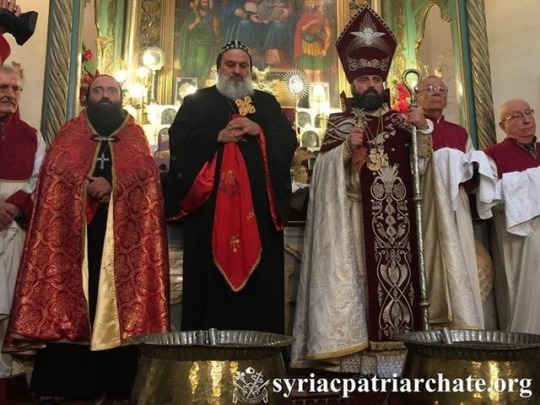
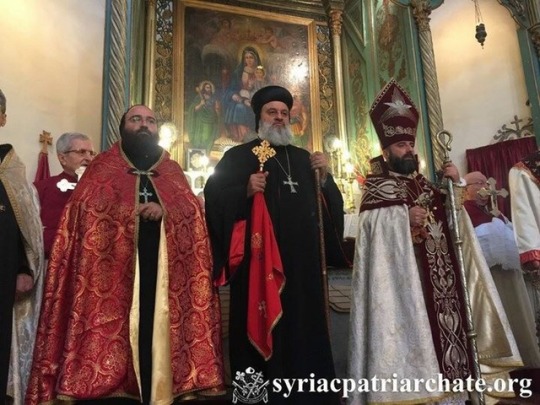
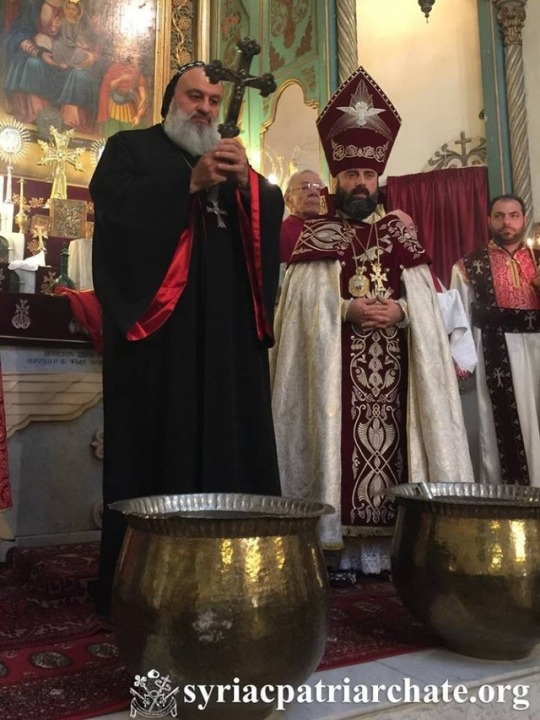



HH Patriarch Mor Ignatius Aphrem II participates in the Nativity and Theopany Divine Liturgy at St Sarkis Armenian Apostolic Cathedral in Bab Touma Damascus with HE Armash Nalbandian Archbishop of Damascus celebrating the Liturgy
12 notes
·
View notes
Photo

“Entry into Jerusalem.” Illuminated manuscript by famed Armenian (Cilician) artist Toros Roslin, 1288.
25 notes
·
View notes
Photo
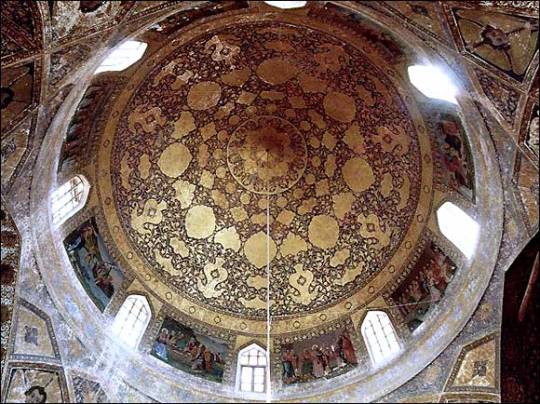
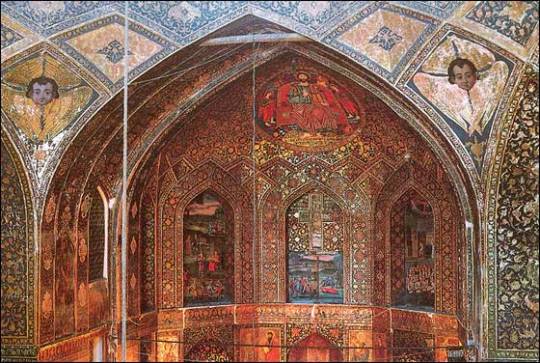
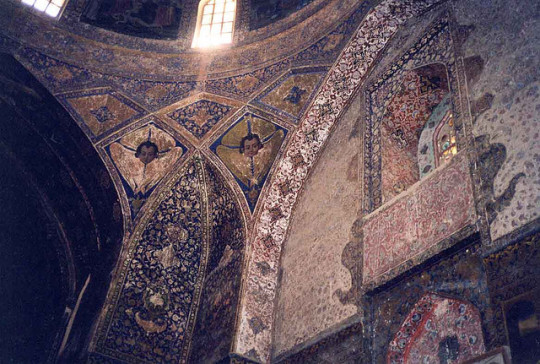

The Armenian Vank Cathedral, Esfahan, Iran
1K notes
·
View notes
Photo
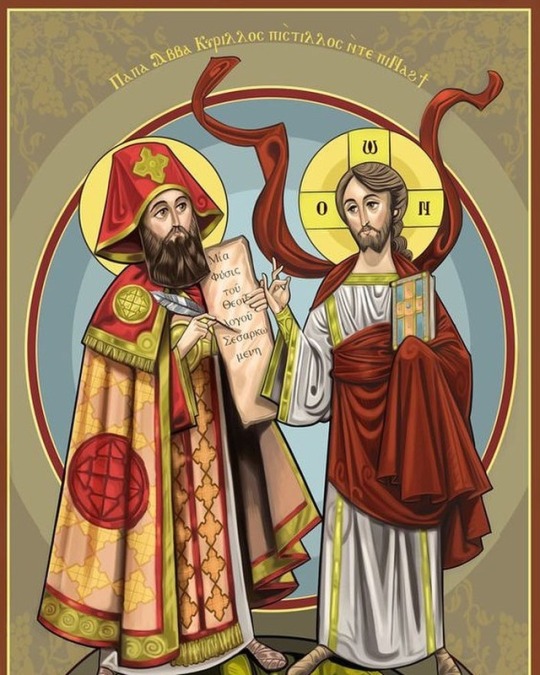
~One nature of God the Word Incarnate~
“The Oriental Orthodox expression of the Personhood of Christ, while Eastern Orthodox use the expression ‘One Hypostasis.’ Oriental Orthodox describe two natures before the union which become one nature fully divine and fully human while Eastern Orthodox describe two natures before the union which become one hypostasis having both a fully divine nature and fully human nature. Just two different ways of expressing the same reality.”
~David C. Wright
16 notes
·
View notes
Text
"John's baptism was a baptism of repentance. He told the people to believe in the one coming after him, that is, in Jesus."

Meanwhile a Jew named Apollos, a native of Alexandria, came to Ephesus. He was a learned man, with a thorough knowledge of the Scriptures. He had been instructed in the way of the Lord, and he spoke with great fervor and taught about Jesus accurately, though he knew only the baptism of John. He began to speak boldly in the synagogue. When Priscilla and Aquila heard him, they invited him to their home and explained to him the way of God more adequately.When Apollos wanted to go to Achaia, the brothers encouraged him and wrote to the disciples there to welcome him. On arriving, he was a great help to those who by grace had believed. For he vigorously refuted the Jews in public debate, proving from the Scriptures that Jesus was the Christ.While Apollos was at Corinth, Paul took the road through the interior and arrived at Ephesus. There he found some disciples and asked them, “Did you receive the Holy Spirit when you believed?"They answered, "No, we have not even heard that there is a Holy Spirit."So Paul asked, "Then what baptism did you receive?”“John’s baptism,” they replied.Paul said, “John’s baptism was a baptism of repentance. He told the people to believe in the one coming after him, that is, in Jesus.” On hearing this, they were baptized into the name of the Lord Jesus. When Paul placed his hands on them, the Holy Spirit came on them, and they spoke in tongues and prophesied.
Acts 18:24-19:6
11 notes
·
View notes
Photo

“To say that Mary is the Mother of God does not imply that she is the origin of God or precedes God or outranks God or is divine.
It means only that Mary gave birth to Jesus and Jesus is divine as well as human.”
~Fr. John Keller
(Icon via Coptic Hymns)
87 notes
·
View notes
Photo
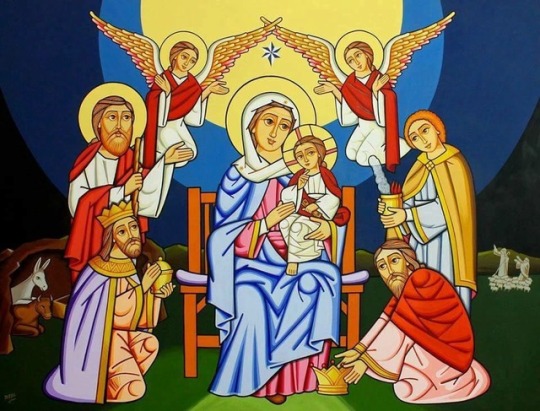


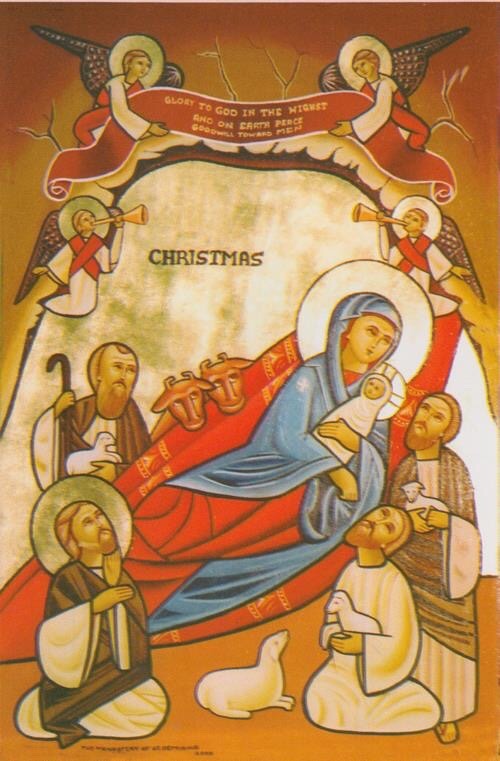
For our Coptic, Ethiopian, and Eritrean Brothers and Sisters a blessed Christmas today.
Christ is born, Glorify Him!
7 notes
·
View notes
Photo
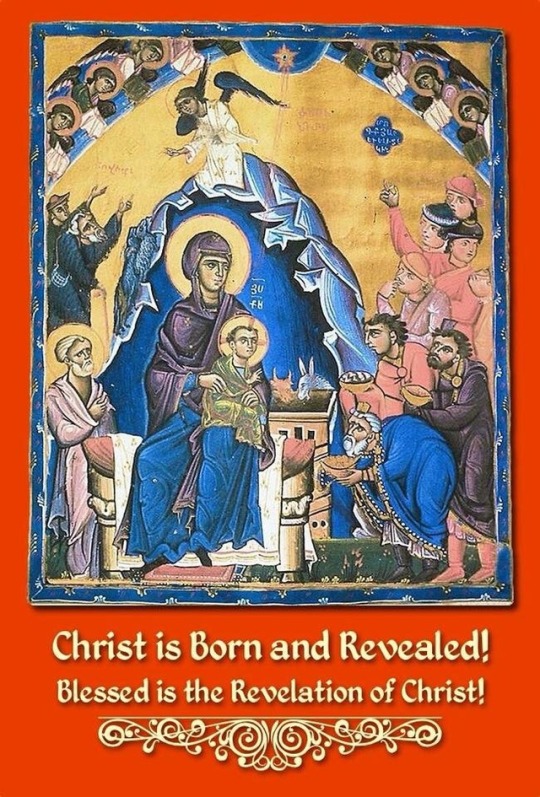
For our Brothers and Sisters in the Armenian Church have a blessed Christmas today
Քրիստոս ծնաւ և յայտնեցաւ,
ձեզ և մեզ մեծ աւետիս
#armenian apostolic church#armenian orthodox#armenian#orthodoxy#christmas#nativity#epiphany#christianity
4 notes
·
View notes
Photo

1 note
·
View note
Photo
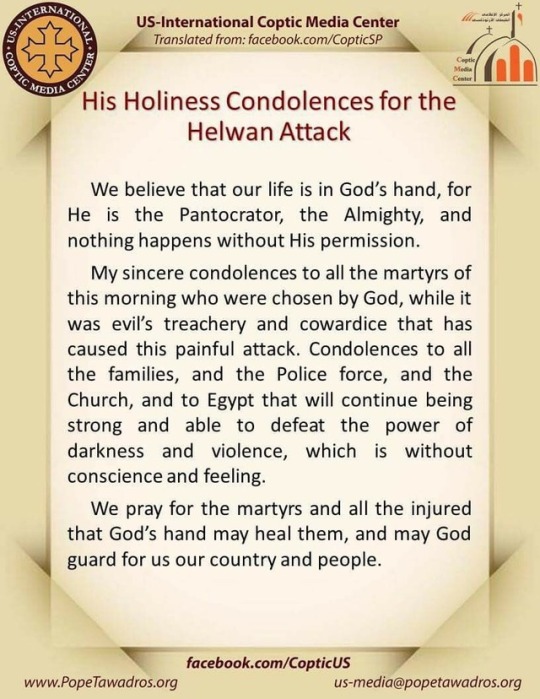
#hh pope tawadros ii#coptic#coptic orthodox#orthodoxy#orthodox#egypt#helwan attack#helwan martyrs#christianity
2 notes
·
View notes
Photo
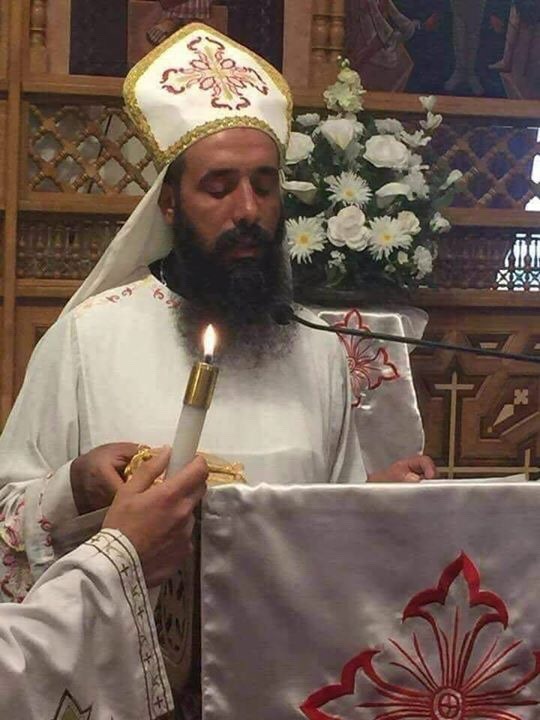
H.G Bishop Youssef's Statement on the Martyrdom of Reverend Hegumen Father Samaan Shehata Priest at Saint Julius Akfahs Coptic Orthodox Church in Al-Fashn, Egypt The killer of an innocent man hastened to slaughter a servant of God. On October 12th, 2017, hatred delivered another innocent martyr into God’s hands. God will require the blood of this saint from the hands of his murderer and those who instilled the ideology of hatred and violence into the killer’s mind and heart. Accomplices to this murder are also those that remained idle and refused to help save his life. Not only from all these hands—the killer, his mentors, and the apathetic witnesses, but the entire lives of these murderers will forever be marred with calamities multiplied by the grief brought upon the family and community of Reverend Father Samaan Shehata. To where can murderers run to hide their shame, guilt, and disgrace? Can a murderer do God’s will? Why do they hide and lurk in secret assemblies, waiting and conniving on how to attack the innocent? God honors the compassionate and merciful because God is compassionate and merciful. When the Apostle Peter thought to defend Christ, the Lord admonished him, “Put your sword in its place, for all who take the sword will perish by the sword” (Matthew 26:52). The merciful God has rejected murderers because they have robbed life—a life that God created. God is the one that gives life and only He can take it away in His own time. Murderers cheat God and provoke Him to strike back at them—the assassins and violent men that hasten to destroy life. There is no place for murderers in heaven. The definition of martyrdom is one who dies for his belief, not the one who kills for it. Killers cannot understand the law of love. Father Samaan was an innocent man. A priest has given up a life of comfort to serve his community and be an example of grace and charity to all. God is fed up with this violent human race. With one breath He can devastate islands and continents, mountains and seas. Therefore, fear God; and fear Him, now. Vengeance belongs to God alone (Cf. Deuteronomy 32.35; Roman 12:19). Father Samaan was ready; but from whose hands his precious life was taken, it is this man and those who condone this vile act that are just as guilty and provoke God to wrath. Those who kill Christians do so because they fear them. They still do not comprehend the power of love. Christ loves all humanity and chose to suffer and die to save the world. His humble disciples and apostles—none that bore weapons and none that made threats, spread Christianity. Almost all were martyred; yet, Christianity spread and flourished throughout the world. Christianity was and continues to be spread by the martyrs. “But the cowardly, unbelieving, abominable, murderers, sexually immoral, sorcerers, idolaters, and all liars shall have their part in the lake which burns with fire and brimstone, which is the second death” (Revelation 21:8). We implore the Lord Jesus Christ to repose the soul of His faithful servant, Reverend Hegumen Father Samaan Shehata, comfort his family and congregation, awaken the conscience of all Egyptian citizens to put an end to these butcheries and barbarisms, bring this martyr’s murderers to justice and repentance, and empower Christianity to spread and flourish more and more and more.
10 notes
·
View notes
